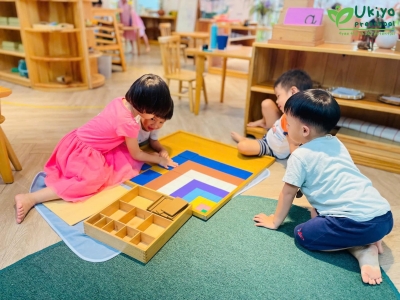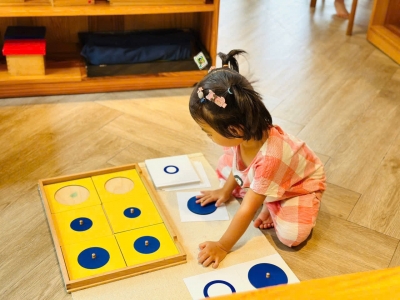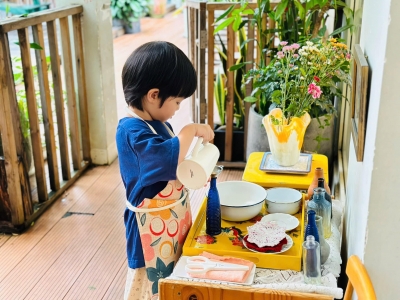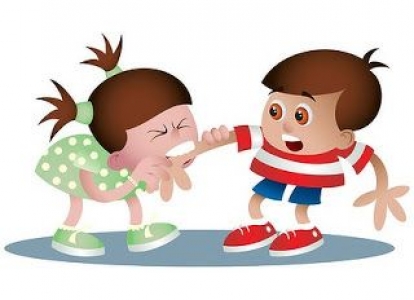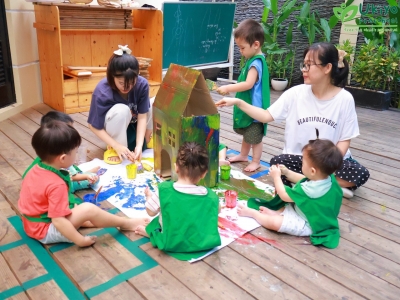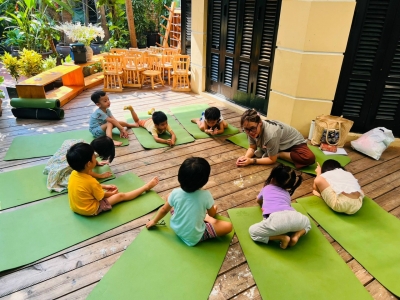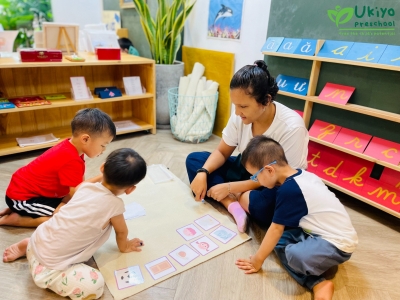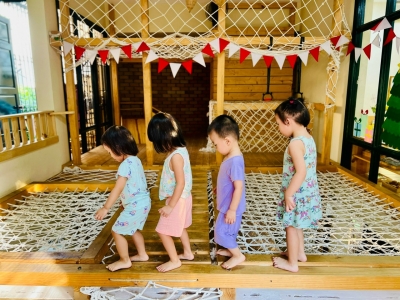Imagination and Fantasy: Perspectives and Impacts from the Montessori Approach

Childhood is often filled with magical stories. Adults create fictional characters like fairies, mermaids, or individuals with extraordinary powers, believing that children need a world of imagination. They share these fantastical tales day by day, and children believe them all due to their inherent trust in adults.
However, when children realize these stories are not real, many feel disappointed and even betrayed. This reaction often stems from adults misunderstanding the true needs of children. We assume that children prefer mythical characters over reality, yet their drawings tell a different story: children often draw their parents, siblings, or familiar things from daily life.
Montessori’s Perspective on Imagination
A common misconception is that the Montessori method, which emphasizes reality, does not encourage imagination and creativity. In truth, Montessori celebrates imagination—but not fantasy. Imagination is nurtured through real-life experiences and activities, where children explore, touch, and create from what they see and feel around them.
As Dr. Maria Montessori stated:
"The child’s mind between three and six can not only see by intelligence the relations between things, but has the higher power still of mentally imagining those things that are not directly visible."
In Montessori environments, art, music, and exploration of nature play a vital role in fostering imagination. Instead of immersing in unrealistic stories, children are encouraged to recreate and innovate based on their real-world experiences, promoting creative and independent thinking.
Imagination vs. Fantasy: A Key Distinction
Imagination is the ability to form ideas or images in the mind, grounded in experiences and reality. It is closely tied to the real world and serves as the foundation for innovation. Imagination helps children recreate or envision new possibilities from reality. For example, a child might see a falling leaf and imagine using it as a boat. This type of creative imagination supports intellectual growth and problem-solving skills.
In contrast, fantasy involves creating ideas or images that lack any basis in reality, such as magical powers or supernatural characters. While entertaining, fantasy does not offer real-world value and can lead to negative consequences:
- Limits realistic thinking: Children can become engrossed in mythical worlds, disconnecting from reality.
- Reduces self-reliance: They rely on unrealistic elements to solve problems instead of developing independence.
- Psychological disappointment: When they realize what they believed is untrue, children may feel betrayed and lose trust in adults.
Impact on Development During the First Six Years
Between ages 0-6, children are in the "absorbent mind" phase, where every experience strongly shapes their personality and understanding.
Imagination
Imagination positively impacts children’s development by:
- Fostering abstract thinking: Children connect real-world elements to generate new ideas.
- Enhancing problem-solving skills: They imagine creative approaches to tackle real-life challenges.
- Stimulating curiosity: Children actively explore the world with confidence and enthusiasm.
Fantasy
On the other hand, fantasy can lead to certain drawbacks:
- Disconnection from reality: Children may avoid real-world challenges by retreating into imaginary worlds.
- Limited logical thinking: They may struggle to distinguish between what is real and what is not.
Montessori: Reality as the Foundation for Imagination
In the Montessori approach, reality is the foundation for cultivating imagination. By engaging with real-world materials, children not only develop motor skills but also learn to connect real elements to create innovative ideas.
Activities such as caring for plants, drawing nature, or learning about the universe help children naturally develop imagination. Montessori emphasizes that imagination must be rooted in reality to create lasting value.
Imagination and fantasy are distinct concepts with clear impacts on children’s development during their first six years. Imagination, grounded in reality, enables children to explore, create, and grow holistically. Fantasy, while entertaining, may hinder logical thinking and a child’s connection to the real world.
As caregivers and educators, we must provide a rich environment of real-life experiences, encouraging children to use their imagination to discover and create, thereby building a strong foundation for their future.
Notes:
It is neither necessary nor helpful to “teach” the child to pretend or imagine. Children construct their imagination through their own efforts and experience, as a uniquely human aspect of their mind. Joyful learning comes when children make discoveries and connections themselves. This principle underscores the Montessori approach to presenting lessons and materials, and it is also why we should not dictate how/when children are to use their imaginations. Instead, Montessori advises that we “prepare an environment which will allow the child to exercise his efforts and aid the development of his imaginative intelligence.”
If teachers don’t understand how imagination and pretend can manifest as purposeful activity, they are thwarting an opportunity for discovery and development just as if they slapped the child’s hand reaching out to touch a beautiful object. “Don’t pretend!” is the mental equivalent of, “Don’t touch!” The child will do what nature tells them they must; whether it is touching or pretending - it is only the adult’s response that makes the difference between construction and destruction. It takes a nuanced understanding of the developmental purposes of the Montessori materials to make this distinction.
“The power to imagine always exists, whether or not it has a solid basis on which to rest, and materials with which to build. But when it does not elaborate from reality and truth, instead of raising a divine structure, it compresses the intelligence and prevents the light from penetrating.” (Montessori 1918)
Others



